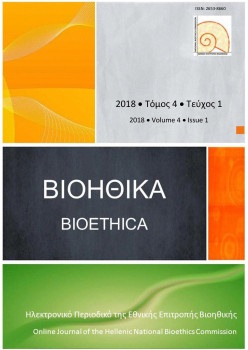Grasping the Legal and Bioethical Issues of “Wrongful life”
Abstract
The present manuscript focuses on the special features of “wrongful life” cases and the ethical philosophical questions they arise. Our main goal is to conclude whether the handicapped child should be compensated by the doctor who negligently failed to diagnose or inform the child’s parents about potential birth defects. Is the doctor morally responsible? Should he be held liable for the existence of the impaired child? Can a life ever be considered a source of damage? Is handicapped life of less value?
Through the analysis of moral and legal theories as well as the comparative overview of the international- basically European and Greek case law we find out that the moral evaluation of the doctor’s behavior is in coincidence with the general practice of courts to dismiss wrongful life lawsuits. Contrary to the argument for recognizing wrongful life actions based on the lack of social support structures for the vulnerable and retarded children, we conclude that their financial support is a matter of social policy and it should not be passed on the doctor who did not cause the impaired condition.
Article Details
- How to Cite
-
Κουδουμά (Ioulia Koudouma) Ι. (2018). Grasping the Legal and Bioethical Issues of “Wrongful life”. Bioethica, 4(1), 40–54. https://doi.org/10.12681/bioeth.19697
- Section
- Original Articles
Authors who publish with this journal agree to the following terms:
- Authors retain copyright and grant the journal right of first publication with the work simultaneously licensed under a Creative Commons Attribution CC BY 4.0 License, which allows for immediate free access to the work and permits any user to read, download, copy, distribute, print, search, or link to the full texts of articles, crawl them for indexing, pass them as data to software, or use them for any other lawful purpose. Appropriate credit must be given by citing the author(s) and the original publication in this journal.
- Authors are able to enter into separate, additional contractual arrangements for the non-exclusive distribution of the journal's published version of the work (e.g. post it to an institutional repository or publish it in a book), with an acknowledgement of its initial publication in this journal.
We encourage authors to deposit their articles, as well as data underlying the publications, in institutional and/or other appropriate subject repositories.
Bioethica permits and encourages authors to archive the final publication pdf in institutional (e.g. the repository of the National Hellenic Research Foundation) or other appropriate subject repositories (e.g. SSOAR repository for social sciences), in compliance with institutional and/or funder open access policies, after publication in the BIOETHICA. Authors must provide bibliographic details that credit publication in the journal, as well as related funding details (when applicable).
Lists of institutional and other subject-based academic open access repositories can be found listed by country at the registry http://opendoar.org/countrylist.php
If your institution does not possess a repository you may deposit a copy of your paper at no cost with www.zenodo.org , the repository supported for open access research in the EU by the European Commission, through the project OpenAIRE (www.openaire.eu )



